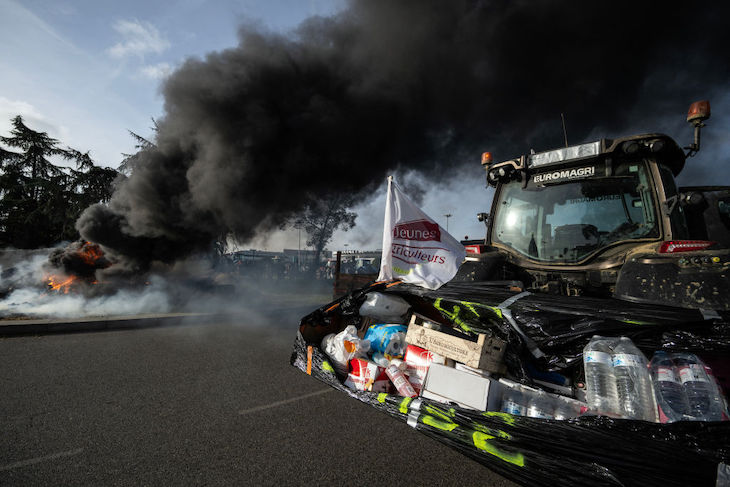The toll station on the A9 motorway near the French-Spanish border is closed with cones and guarded by the local gendarmes. A few dozen trucks are parked on the grass verges, waiting for the farmers’ barricades to open. The farmers themselves have gone, heading north to barricade Montpellier. The autoroute is utterly, weirdly silent. A thundering corridor of commerce completely closed.
The truckers I talk to like that I’m British, congratulating me on Brexit as if I was personally responsible. They uniformly support the farmers although it is their livelihood that is being disrupted. Why? It is long past the time that credulous French people should support petulant farmer ‘unions’ demanding ever more enormous handouts.
Those guys with the big John Deere engines are not peasants
The peasants’ revolt now laying siege to Paris isn’t all it seems. Those guys with the big John Deere engines are not peasants. They are industrial-scale farmers of subsidies who masquerade as horny-handed sons of toil. Their tractors have air conditioning and cost €100,000 (£86,000).
They’re right to push back against the crazy net zero attack on farming generally across the EU. But their demand for more handouts is insolent and their demand for protection from non-French imports is impossible in the context of Europe, although some sort of fudge may eventually be contrived.
Only the brave dissent, and only in private. Driving back to the village after lunch in Pézenas, my passenger noticed that someone had turned our official village sign upside down. This basculation of place signs has become a popular gesture of solidarity with the farmers, and is happening all over France.
‘Connards,’ pronounced my passenger, triggered. ‘The farmers should go…themselves. They’re the most privileged people in France.’ In the popular imagination, the peasant farmer occupies a mythological place, even if, in the era of the hyper supermarket, it is ever more detached from reality.
The naked hypocrisy over the support for the whiny farmers is easily confirmed by examining the contrast between what French people responding to journalists and opinion polls say – that the farmers are the soul of France – and how French consumers behave in the wild – which is to hoover up cheap imported olive oil, fresh fruit and vegetables, meat and wine from supermarkets big enough to park half-a-dozen jumbo jets.
For Gabriel Attal, Emmanuel Macron’s new prime minister, a master of spin now in charge of taking the heat while Macron prances around in India, it’s an irresolvable problem. He can’t give the farmers what they want because what the farmers are demanding conflicts with what the EU is imposing. But he can’t not, otherwise the economy shuts down. It’s all so very French. Attal, at least, offered comic relief posing in his sharp suit next to a big bale of silage, when he ventured out of the Hôtel Matignon to meet some actual farmers. The man needs his tailor to run up some bleus de travail.
Unsympathetic though the farmers may be, perhaps they are a harbinger. Protests in Holland and Germany and now France mark a revolt against the EU which is inevitably going to lead to strong progress in forthcoming European elections for political movements of the right. I talked to the head of one of France’s most respected pollsters in Paris the other day and he had no doubt Marine Le Pen would be the next president of France. I suggested the moderate Édouard Philippe. He laughed.
Agricultural subsidies amounted to €9.5 billion (£8.1 billion) in 2023 – 10 per cent of the total value of agricultural production in France, according to INSEE, the French statistics agency. Operating subsidies of €8.4 billion (£7.2 billion) are paid based on land area or livestock numbers. These subsidies are designed to help farmers cover their operating costs, such as fuel, feed, and machinery. An additional €1.1 billion (£900 million) of subsidies is paid on products, including cereals, dairy products, and meat. Much of this goes into the pockets of industrial-scale farmers, the cereal barons. And that’s not counting the tax concessions, including flat-rate expense deduction, income smoothing, investment incentives, tax breaks in designated rural zones, low tax rates on capital gains from the sale of agricultural land and a special property tax regime.
Largely absent from the barricades currently surrounding Paris are the eleveurs – the real peasant farmers raising beef and lamb in the Aubrac or Brittany. They can’t abandon their animals to act out on the autoroutes. Life for these guys can be very hard.
The showdown between the farmers and the government has yet to play itself out. I’ll guess this is mostly theatre and the government will buy off the grifters. But hesitate before taking sides in this because it’s not exactly as it seems. I’ve done a little farming myself and I know manure when I see it.







Comments